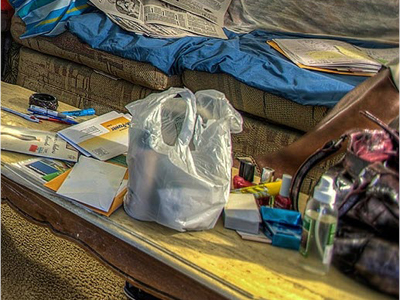Odor Removal Services
Odors stemming from fire and smoke damage, water and mold damage, sewage and biological sources are an invisible threat that can disrupt your life and your health. In particular, smoke and odor particles continue to be airborne many days after a fire has stopped. Whatever the root of the problem, we have the professional products, systems and specialty equipment to remove a wide range of odors so you can breathe easy again.
Count on us to be at your side, and on your side.
Sometimes, multiple treatments are necessary during the odor removal process. That’s why our professional odor removal company will meet with you and explain all the details up front. In addition to providing step-by-step explanations throughout the process, we work closely with you to develop the best solution for you and your home.
OUR PROVEN ODOR REMOVAL TECHNIQUES
We use a range of advanced deodorization tools to eliminate odor from your home:
- Air scrubbers use high-efficiency particulate air (HEPA) filtration to remove odorous particles from the air, enhancing the efficiency of cleaning and clearing the air for safe breathing
- Thermal fogging neutralizes odor, using a strong deodorizer that penetrates everywhere the smoke traveled
- Ozone is an oxidizing agent produced by a portable ozone generator
- OdorKlenz® technology contains a natural, effective deodorizing process that removes odors and air particulates using OdorKlenz-Air® cartridges in traditional air scrubbers.
- Hydroxyl Generators use hydroxyl radicals to eliminate odor from the surrounding areas.
Prevent Odors with Regular Maintenance
One of the best ways to keep your home smelling fresh is to prevent odors from occurring in the first place. Regular maintenance can help eliminate the sources of bad odors and keep your home smelling clean and inviting.
Here are some maintenance tips to prevent odors:
- Regularly clean and vacuum your carpets and upholstery to remove dust, dirt, and pet dander that can cause odors.
- Empty and clean your trash cans frequently to prevent the buildup of food waste and other smelly items.
- Keep your kitchen clean by wiping down countertops, washing dishes promptly, and regularly cleaning out your refrigerator.
- Ensure proper ventilation in your bathroom by using exhaust fans, opening windows, and cleaning your bathroom regularly.
- Inspect and clean your HVAC system regularly to prevent the growth of mold and mildew that can cause unpleasant odors.
By following these maintenance tips, you can keep your home smelling fresh and avoid the need for extensive odor removal services. However, if you do experience persistent odors in your home, our team at ServiceMaster Restoration by FUSON is here to provide effective and customized odor removal solutions.
Why Hire ServiceMaster Restoration by FUSON
1. Expertise and Experience: With decades of experience, ServiceMaster has built a reputation for excellence in odor removal services. Our skilled professionals have encountered a wide array of odor issues and are well-equipped to address even the most challenging cases.
2. Customized Solutions: We understand that each odor issue is unique. Our team provides personalized odor removal plans tailored to your specific needs, ensuring that we use the most effective techniques for your situation.
3. Advanced Technology: ServiceMaster utilizes cutting-edge equipment and technology to eliminate odors at their source. Our state-of-the-art tools, such as ozone generators, hydroxyl generators, and thermal fogging machines, are designed to achieve exceptional results.
4. Safety First: Your safety is our top priority. We follow stringent safety protocols and use environmentally friendly deodorizing agents to ensure that the odor-removal process is safe for you, your family, and your pets.
5. Source Identification: We don't just mask odors; we get to the root of the problem. ServiceMaster experts identify and eliminate the source of the odor, whether it's mold, smoke, pet accidents, or another issue, to prevent future recurrences.
6. Speed and Efficiency: Our professionals work efficiently to minimize disruptions to your daily life. We understand the urgency of odor removal, and we aim to restore your home as quickly as possible.
Frequently Asked Question About Odor Removal Services
How Does the Odor Removal Process Work?
1. Assessment:
- The first step involves a thorough assessment to identify the type of odor, its source, and the extent of the contamination. This helps in developing a targeted removal strategy.
2. Source Elimination:
- The removal process often starts with addressing the root cause. This may involve cleaning, repairing, or removing the source of the odor, such as moldy materials, smoke-damaged items, or pet stains.
3. Cleaning and Sanitization:
- Cleaning surfaces and materials that have absorbed or retained odors is crucial. Specialized cleaning agents and techniques are employed to eliminate odor particles.
4. Air Filtration:
- High-efficiency particulate air (HEPA) filtration systems are used to capture airborne particles, including odor molecules. This helps in improving air quality and reducing lingering smells.
5. Ozone Treatment:
- Ozone generators may be used to neutralize odors by breaking down molecules responsible for the smell. This process is effective but requires careful handling and proper ventilation.
6. Thermal Fogging:
- Thermal fogging involves dispersing a deodorizing fog throughout the space. This technique is effective in reaching hidden or difficult-to-access areas where odors may linger.
7. Sealants and Encapsulation:
- In some cases, especially for persistent odors in porous materials, sealants or encapsulation products are applied to trap and prevent the release of odor molecules.
8. Deodorizing Agents:
- Specialized deodorizing agents are applied to surfaces, fabrics, and materials to neutralize odors. These agents may come in various forms, such as gels, sprays, or granules.
9. Ventilation and Aeration:
- Proper ventilation is essential to facilitate the removal of odors. Aeration helps in bringing in fresh air and expelling remaining odor particles.
10. Follow-up Inspection: - After the initial treatment, a follow-up inspection is conducted to ensure that the odor removal process was successful. Additional treatments may be applied if necessary.
What Causes Persistent Odors?
1. Residual Contamination:
- Lingering odors often result from incomplete removal of the source or residual contamination. Proper identification and thorough cleaning are essential to address this issue.
2. Porous Materials:
- Porous materials like wood, fabric, and certain types of insulation can absorb and retain odors. If not adequately treated, these materials may continue to emit smells over time.
3. Mold and Mildew:
- Mold and mildew growth can produce musty odors that persist even after the removal of visible mold. Comprehensive mold remediation is crucial to eliminate associated smells.
4. Smoke Damage:
- Residual odors from smoke damage, whether due to fires or tobacco, can be challenging to remove. Specialized cleaning and treatment are necessary to address smoke-related smells.
5. Chemical Contamination:
- Exposure to certain chemicals or pollutants can lead to persistent odors. Identifying and removing the source of chemical contamination is essential for effective odor elimination.
6. Inadequate Cleaning:
- Incomplete or ineffective cleaning of affected areas may leave behind odor-causing particles. Thorough and professional cleaning is crucial for successful odor removal.
7. HVAC System Contamination:
- Contamination in heating, ventilation, and air conditioning (HVAC) systems can contribute to persistent odors. Cleaning and sanitizing HVAC components are essential for odor control.
Understanding the specific cause of persistent odors is key to implementing targeted and effective removal strategies. ServiceMaster Restoration by FUSON can provide the expertise needed to identify and address the underlying issues contributing to lingering smells.


